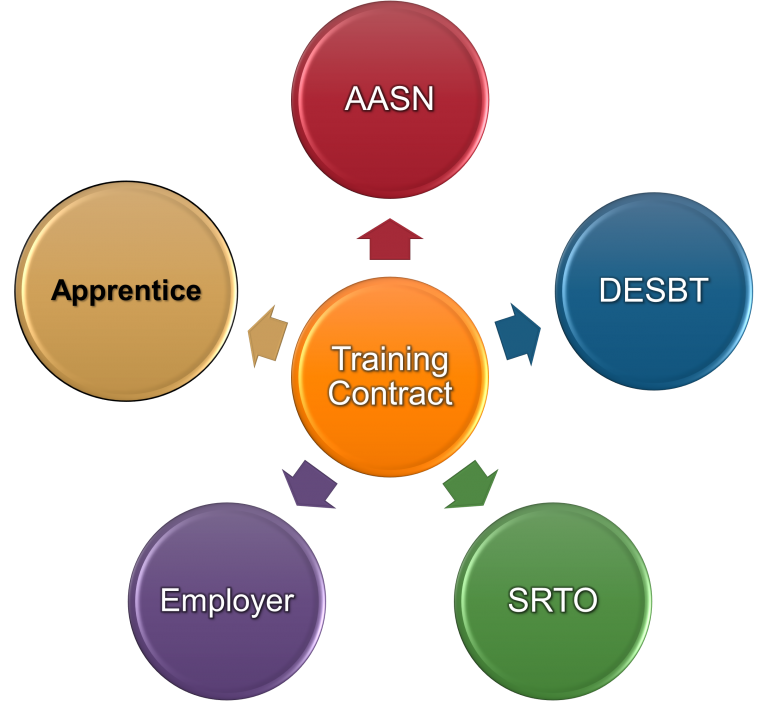An Australian Apprenticeship, commonly known as an apprenticeship, is a learning pathway that combines paid on-the-job training and formal study with a Supervised Registered Training Organisation (SRTO).
It’s a great way to gain a nationally recognised qualification. Earn while you learn!
An apprentice will finish their higher-learning journey equipped with practical skills AND a formal education. This powerful combination of theoretical and hands-on experience is prized by employers across many industries and professions.
There are several parties involved in an Apprentice Training Contract.
Below is an explanation of Who’s Who, and what do they do in the Apprenticeship Zoo.

Apprentice– An apprentice or trainee is an individual employed under a training contract who is undertaking a combination of employment and training.
AASN – Australian Apprenticeship Support Network. Apprenticeship Network Providers offer a free service to industry, employers, apprentices and trainees to assist them with the sign-up, administration and management of apprenticeships and traineeships.
Employer – An employer provides employment and training to assist an individual to complete an apprenticeship or traineeship under the guidance of a training organisation.
SRTO – A supervising registered training organisation (SRTO) delivers the training component of an apprenticeship or traineeship and is responsible for assessing the skills and competence of the apprentice or trainee as they progress.
A SRTO may also be called the registered training organisation (RTO), training organisation or college.
Services include:
Other Definitions:
An Adult apprentice is defined as being aged 21 years or over if they commenced their apprenticeship on or after 1 July 2019, or 25 years or over if they commenced prior to 1 July 2019.
An Apprenticeship is a system of structured on-the-job training with an employer and off-the-job training with a Registered Training Organisation accessed through a contract of training
A Training contract is completed and signed by the employer and apprentice or trainee. This contract binds the parties by conditions and obligations until the completion of the training. A guardian may be required to sign the training contract if the apprentice or trainee is under 18 years of age.
A school-based apprentice is an employee who is undertaking an apprenticeship in accordance with clause 14 while also undertaking a course of secondary education
Parent includes a guardian and a person who has parental responsibility for an apprentice under the age of 18.
Probationary period, for an apprenticeship or traineeship, means the period decided by the chief executive under section 11 as the probationary period for the apprenticeship or traineeship.
ERA – employer resource assessment, for an apprentice or trainee, means a report about the capacity of the apprentice’s or trainee’s employer to provide or arrange to provide the range of work, facilities and supervision required under a training plan.
Training plan, for an apprentice or trainee, means a document stating
Completion certificate means a certificate issued by the chief executive stating that the person named in the certificate has successfully completed the apprenticeship or traineeship stated in the certificate.
Student Contribution Fee’s – please refer to your State Government Authority or SRTO. Please also refer to MA000020 – Building and Construction General On-site Award 2020 – Section 14.6 Training costs—fees and textbooks.
Qualification means a VET qualification under the Commonwealth Act.
Statement of Attainment (SOA) means a VET statement of attainment under the Commonwealth Act.
AQF means the Australian Qualifications Framework within the meaning of the Commonwealth Act, section 3.
Commonwealth Act means the National Vocational Education and Training Regulator Act 2011 (Cwlth).
Fair work Commission means the Fair Work Commission under the Fair Work Act 2009 (Cwlth).
Vocational education and training means the education and training and qualifications and statements of attainment under the vocational education and training provisions of the AQF.